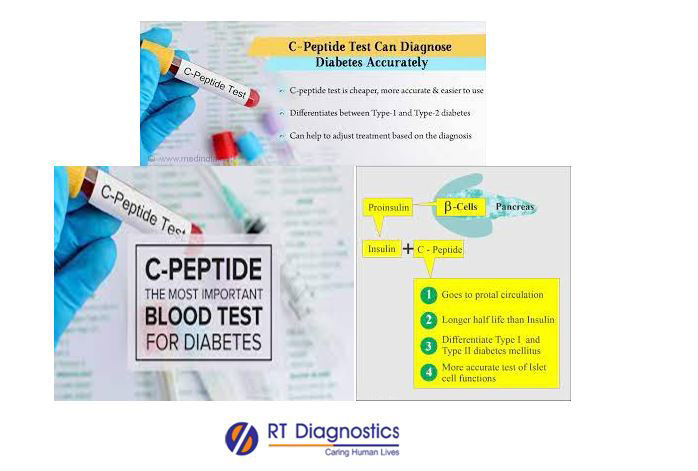C-Peptide (F):
Why C - Peptide (F) Test?
CLINICAL INFORMATION
Insulin is a hormone that decreases blood sugar levels by transporting glucose from the bloodstream into the cells of tissues (Cells require glucose for its energy – it is the main source of energy).
C –Peptide is (also called Connecting Peptide insulin, Pro-insulin C –Peptide, insulin C –Peptide, etc) a useful marker/indicator of insulin production in the body (diabetic patients). In the beta cells of the pancreas (insulin is produced by specialized cells in the pancreas called beta cells), after the cleavage of pro-insulin (biologically inactive molecule); a 31-amino acid C –Peptide is secreted into the portal circulation along with equimolar concentrations (equal amounts) of endogenous insulin and thus the amount of insulin synthesized in the body (by catalysis of pro-insulin) is directly proportional to the concentrations of C –Peptides present in the body. The physiological function of C –Peptide is that it binds to G-protein coupled receptors in different tissues – eg. neuronal, endothelial, fibroblast, renal tubular cells, etc at nanomolar concentrations. The binding of C –Peptide to its receptor activates Ca2+ dependent intracellular signaling pathways such as MAPK, PLCγ, and PKC. It also has an important role in the up-regulation of transcription factors, regulation of enzyme activities such as Enos, Na+K+ATPase activities, anti-inflammatory and pro-inflammatory effects in the body (depending on its level), increases weight (fat mass) also in healthy and non-diabetic patients, helps in the repair of smooth muscles, role in bone density, medication with C –Peptide improves kidney function (reduces albumin excretion, decreases or prevents diabetes-induced glomerular changes secondary to mesangial matrix expansion), modulatory factor in certain symptoms such as peripheral and autonomic neuropathy (C –Peptide treatment in replacement dosage results in improved peripheral nerve function), etc. C –Peptide test is also known as Insulin C –Peptide test. It helps to differentiate between type-1 diabetes (absence or amounts of insulin produced in the body in auto-immune disease where the immune system attacks the cells of the pancreas) and type-2 diabetes (either inadequate amounts of insulin is synthesized by the body and/or has developed insensitivity to insulin -Insulin Resistance). Hence the measurement of C –Peptide helps to calculate the endogenous insulin produced by the body apart from the exogenous insulin injected (medication) for treatment in diabetic patients. C –Peptide test also helps in detecting low blood sugar (hypoglycemia), diagnosing a tumor in the pancreas that results in increased insulin synthesis (insulinoma), in post surgical follow-up during pancreatic surgery (pancreatic islet cell transplants) and kidney diseases, excessive supplementation of insulin medication, alcohol consumption, inherited liver enzyme deficiencies (eg. Due to mutations resulting in in-born errors of metabolism in congenital anomalies/abnormalities), a screening tool to determine the possibility of gastrinoma associated with MEN – 1 and also in PCOS, and follow-up in treatment (implanted insulin pumps), etc. C –Peptide (F) test measures the concentrations of C –Peptide in the diabetic patient’s body while fasting overnight or fasting for 8 to 10 hours before blood testing (early morning blood/urine sample specimen is collected) to diagnose diabetes, to check for insulin resistance and in the prognosis of treatment as how it responds (monitoring during the treatment modalities eg. insulinomas for best therapeutic solutions). The advantage of estimating the levels of C –Peptide over insulin test is that the half life of C –Peptide is much higher than insulin, and hence even when the levels of insulin gets catabolized the levels of C –Peptide still remain for much longer periods which helps as a key factor to monitor in diabetic patients. Causes for high C –Peptide levels are consuming a carbohydrate-rich diet, insulin resistance, obesity, pregnancy, kidney diseases (due to obstructive diseases such as renal calculi or kidney diseases with reduced renal function eg. Congenital abnormalities such as Polycystic kidney disease high levels of C –Peptides are present in the blood), certain medications like sulfonylureas i.e tolazamide, gliclazide, glimepiride etc, glucocorticoids such as prednisone (Dexol, Martapan etc) etc. Causes for low C –Peptide values include Type-1 diabetes, LADA (latent autoimmune diabetes in adults), Type-2 diabetes (insulin-dependent), insulin therapy, hypoglycemia (low blood glucose), fasting, poor functioning of the pancreas, pancreactectomy and kidney diseases (eg. Nephritic diseases C –Peptide excreted due to proteinuria) etc. Clinical manifestations of the patient that may suggest a physician order C –Peptide test with atypical or asymptomatic conditions such as metabolic syndrome, atherosclerosis, weight gain, inflammation, high uric acid, high blood cholesterol, and/ot triglyceride levels, etc. Symptoms of hypoglycemia are sweating, palpitations, excessive hunger, excessive thirst, nervousness, light-headedness, sleepiness, shaking, confusion, blurred vision, fainting/dizziness, and seizures, and loss of consciousness (in severe cases). Other additional tests include the glucose test (insulin C –Peptide test is performed in conjunction along with glucose test) for more accurate follow-ups during prognosis in diabetic patients. Other tests include blood glucose test, glucagon test, HbA1C test, insulin assay, etc.

General Instructions:
Sample Requirement: Specimen - Blood / Urine Test Preparation: Fasting.
NOTE - Sample for specimen collections may vary based on the patient’s condition / cases according to patient’s presenting complaints / signs or symptoms:
SPECIMEN REQUIREMENT (Special or Rare Cases) - As instructed and guided by Physician / Clinician / Pathologist / as per Laboratory’s requirements, according to procedures and protocols.
Sample Requirement: Blood/Urine
Test Preparation: Fasting
This Multi-Specialty Clinical Referral Laboratory RT DIAGNOSTICS provides precise and accurate tests with an extensive range of testing services to the medical centers to help in the diagnosis and identification of pathology in the test specimens for infectious diseases and also to evaluate the function of organ systems of the patient. It prevents further complications and helps to stabilize and restore health to near normalcy at the earliest without delay.



